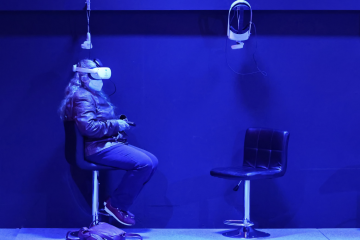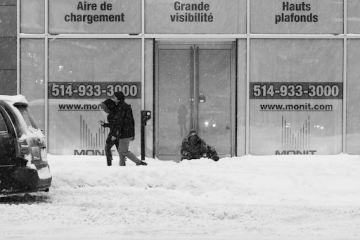It was not until the frigid temperatures of Montréal winter began to bite that the Government took the plight of the city’s unhoused seriously.
As if the disproportionate impact that Covid-19 has on unhoused people is not enough, the inability to conduct social distancing in shelters has left much of Montréal’s unhoused population outdoors to face the cold. The challenges that Covid-19 imposes this winter has forced the public to acknowledge the increased health risks that individuals experiencing poverty, marginalization, and stigmatization face. Some have decided to take action.
Meals for Milton Parc
Sophie Hart, a fourth year student at McGill University, founded Meals for Milton Parc in October to support the unhoused residents on the corner of Rue Milton and Avenue du Parc in Montréal. The organization has since grown to a team of 150 volunteers who have given out more than 400 meals as well as hygiene packages, blankets, and clothing.
Meals for Milton Parc encountered their first obstacle on November 17, when the SPVM told the residents of Milton Parc that they had two weeks to relocate. Despite their compliance, an unmarked garbage truck removed all of their packed up supplies that night, leaving them without any protective gear in subzero temperatures. Describing why this may have occurred, Hart told me in an interview that “there have been complaints about the aesthetics of how it looks on the street corner, and people were calling it an ‘encampment’ which it wasn’t.” She asserted that “there is a strong pushback among community members against their cohabitation with unhoused people.”
Understanding Indigenous Homelessness Within the Context of (Ongoing) Colonization
The general unhoused population of Milton Parc is Indigenous, predominantly Inuit, according to Hart. Although only 5% of Canada’s population is Indigenous, Indigenous individuals are vastly overrepresented in Canada’s unhoused population. Accordingly, a discussion of the challenges that unhoused Indigenous individuals face must be held within the context of the prior and ongoing colonial oppression of Indigenous peoples in Canada.
Rose Henry, a Tle’min Elder from the Tla’amin Nation described her experience with homelessness in 2017: “I… ended up homeless as a consequence of the Sixties Scoop. Going through the Scoop left me wondering which world or culture I belonged in: white Canadian or First Nations community. I was torn between the two. It has had a very damaging effect on me; society told me you’re brown on the outside and white in the middle (as I was brought up in a white home). I was confused and lost, and it was this path that ultimately led me to my life on the streets. My confusion about my identity… was very damaging.”
Henry’s experience of cultural homelessness does not fit into the Canadian Observatory on Homelessness’s definition of homelessness as “unsheltered, emergency sheltered, provisionally sheltered, and at risk of homelessness.” The diverse experiences of Indigenous individuals cannot be defined by the presence or absence of brick walls, for they are manifestations of the varying effects of colonization and oppression of Indigenous peoples.
Looking Forward
So what has been the role of the Canadian government and Montréal city officials in all of this? I asked Hart. “They’ve decided to let the situation just fester for years,” she claimed, describing Montréal’s homelessness situation as “an on-going battle in terms of the government creating bandaid solutions for winters, in order for people not to basically freeze to death outside” but that such solutions are inadequate as they are not created with the input of unhoused people and “don’t have their best intentions at heart.”
In May, shortly before the first peak in Montréal’s Covid-19 cases, a coalition of Montréal’s Indigenous groups released a statement, declaring, “We are uncomfortable with Quebec’s decision to proceed with deconfinement measures whilst the spread of the virus in our sector is only beginning to peak.” The members of the coalition, which include Native Women’s Shelter of Montréal and The Open Door, called on city officials to provide adapted social housing and services for alcohol management and self-isolation.
In October, Montréal Mayor Valérie Plante said on Tout le monde en parle, “I think we must seize the opportunity to quickly give a roof to many people who are currently on the streets or who have a very precarious status,” and stated that she was working with federal and provincial governments to provide temporary housing in hotels for unhoused individuals.
Despite the Mayor’s efforts to relocate unhoused individuals from shelters, where the virus spreads rapidly, to more socially distanced hotel housing, the operation requires many unhoused individuals to relocate across the city. “People want permanent housing and people want to have affordable housing where they can live in the same place for years in their community,” said Hart. She went on to describe how “it’s not fair to ask people to go across the city and leave their community, especially if they have mobility issues. You’re basically upending their entire life and taking them to somewhere they don’t want to be. People need their communities they’ve created, their families they’ve created.”
On November 23, Mayor Plante said, “We need to bring people to other types of services because it is getting cold out there,” and, “We are lucky because we have a lot of different types of resources,” regarding the city’s introduction of hotel accommodations, a shuttle bus, warming stations, and storage lockers.
However, these are only short term solutions to a long term problem. In devising immediate strategies to protect unhoused Montréalers from both the cold and Covid-19, the federal government and city officials must acknowledge the diverse needs of unhoused individuals in order to ensure that they are both effective and equitable. In Hart’s words, “the only way people are going to use services is if they’ve been created with their input and their best interest in mind, which the services right now aren’t.”
The issue of housing during the first winter of the Covid-19 crisis has brought discussions of colonization, stigmatization, racism, and public health disparities to a head. In order to protect the people who find themselves battered at the epicenter of these forces of oppression, the city of Montréal must implement long-term strategies for permanent housing that are devised by and for Indigenous and unhoused communities.
Meals for Milton Parc is actively seeking volunteers. To get involved, you can email them at mealsformiltonparc@gmail.com or message them on Facebook or Instagram. You can also donate to help with their efforts through Interac e-transfer (mealsformiltonparc@gmail.com) and PayPal donations on their website. “The three things we can ask of anyone,” said Hart, “is to donate their time, donate their money or help educate with us” by spreading the news on social media, or by word of mouth “for better treatment of unhoused people.”
Featured image by Charles Contant/CBC.




